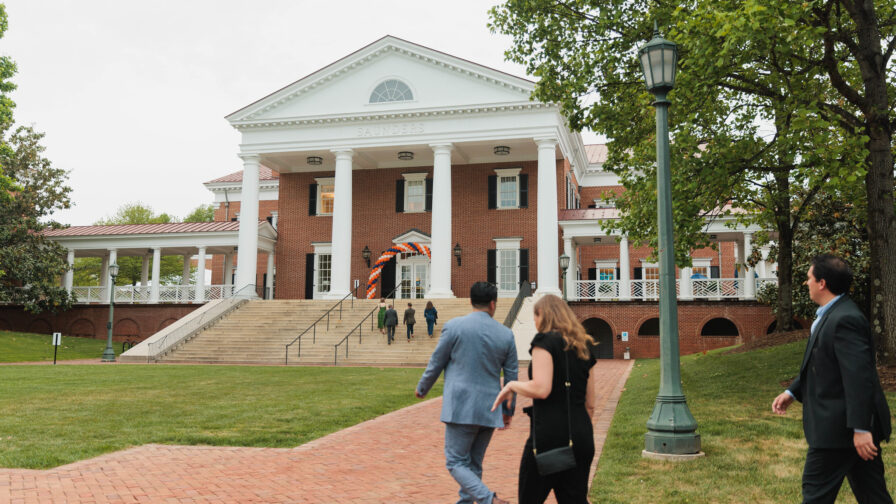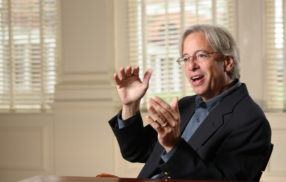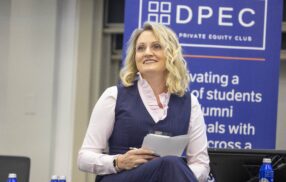
Economic Forecast 2024: Is the Soft Landing Here?
By Dave Hendrick
With robust GDP, low unemployment and moderating inflation, the U.S. economy appears to be in a position of strength that seemed almost unthinkable a year prior. But can the (relatively) good times last?
Speaking to the University of Virginia Darden School of Business community at an event hosted by the Richard A. Mayo Center for Asset Management on 2 February, shortly after the release of a new federal jobs report showing an unexpectedly strong hiring boom, Darden Professor Alan Beckenstein and lecturer and economist Nick Sargen offered their annual economic forecast, trying to make sense of the past year while offering insights for the year ahead.
Beckenstein described recent history as a period dominated by shocks, with the COVID-19 pandemic disrupting markets near and far and massive infusions of government stimulus needed to help prevent the economy from cratering.
“We’ve gone through some strange times to say the least,” said Beckenstein. “Who thought we were going to go into a boom period at the start of 2023?”
And while traditional indicators of economic strength are trending in positive directions, consumer sentiment has not necessarily tracked up with the numbers. A lagging indicator, the recent positive turn in consumer sentiment could have significant implications for what could be a source of a future shock: the upcoming U.S. presidential election.
Sargen suggested investors moved into 2024 relatively upbeat because of a widespread sense that the Federal Reserve was close to pivoting, backing off the interest rate rises that have been credited with helping to tame inflation. With something like full employment and inflation back under control, the Fed appears close to having achieved the much-desired soft landing.
“Every forecaster asked how they could get out [of an inflationary environment] without a recession and somehow they did it,” Sargen said.
The broader economic trend may be one of economic normalization. The rough growth trajectory since the 2008 financial crisis has been two percent GDP growth and two percent inflation. Four years since the onset of the pandemic, we may now be returning to a relatively normal period, even if it does yet feel that way for many in the U.S.
Sargen said he thought the economy and equity markets would generally return to a period of moderate growth in the year ahead, with equity returns unlikely to match 2023, but cautioned that almost no one predicted the acceleration in growth that occurred in the back half of last year.
“Everyone got it wrong, including me,” Sargen said. “At the end of last year, I thought all of the good news was priced in.”
One potential driver of growth is the rise of generative AI. Sargen said a key takeaway for him from the most recent UVA Investing Conference was that the promise of the new technology was very real, likening it to the advent of the internet browser. While he said he did not share the view of some “super optimists” who believe the technology could lead to a doubling in productivity, nonetheless it is a disruptive force that may boost productivity, and has certainly boosted the valuations of a select few publicly traded stocks.
Like Beckenstein, Sargen pointed to the upcoming presidential election as a wild card for the economy. Presumptive nominee Donald Trump may pursue protectionist tariffs if he wins, for instance, while a reelected President Joe Biden would be confronted with whether to extend tax cuts that are currently scheduled to expire in 2025.
In addition to the upcoming election, Beckenstein noted the potential for shocks from trends that are not abating, including climate-related disasters, threats from foreign adversaries and state and federal governments paralyzed by partisanship.
The University of Virginia Darden School of Business prepares responsible global leaders through unparalleled transformational learning experiences. Darden’s graduate degree programs (MBA, MSBA and Ph.D.) and Executive Education & Lifelong Learning programs offered by the Darden School Foundation set the stage for a lifetime of career advancement and impact. Darden’s top-ranked faculty, renowned for teaching excellence, inspires and shapes modern business leadership worldwide through research, thought leadership and business publishing. Darden has Grounds in Charlottesville, Virginia, and the Washington, D.C., area and a global community that includes 18,000 alumni in 90 countries. Darden was established in 1955 at the University of Virginia, a top public university founded by Thomas Jefferson in 1819 in Charlottesville, Virginia.
Press Contact
Molly Mitchell
Associate Director of Content Marketing and Social Media
Darden School of Business
University of Virginia
MitchellM@darden.virginia.edu




